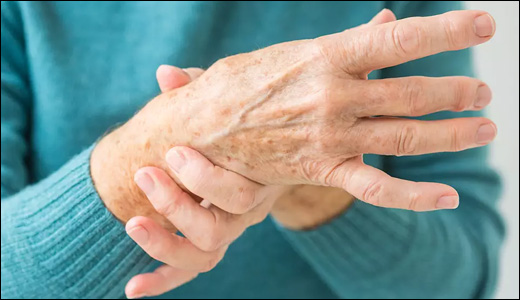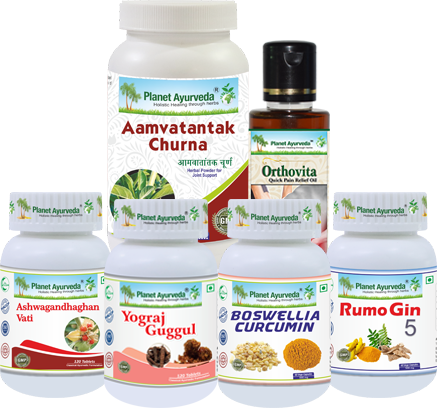Can Ayurveda Help In Treating Carpal Tunnel Syndrome?
Abstract
Carpal Tunnel Syndrome (CTS) is a common musculoskeletal disorder characterized by compression of the median nerve at the wrist, leading to symptoms like numbness, tingling, and pain in the hand and fingers. It is most prevalent in individuals aged 30-60 years. It tends to affect women more often than men, with women being up to three times more likely to develop the condition. Globally, the likelihood of developing carpal tunnel syndrome (CTS) varies, but it’s estimated that around 3-6% of adults will experience it at some point in their lives, due to factors like repetitive strain or underlying health conditions. Though it can affect anyone, certain factors, such as gender, age, and underlying health conditions, can increase the likelihood of developing CTS. Diagnosing CTS early and managing it properly is key to preventing it from getting worse and causing long-term problems.

Introduction
The carpal tunnel is a narrow passageway in the wrist, formed by bones and ligaments. The carpal tunnel contains the median nerve, which is responsible for feeling sensations in the palm side of your thumb, index, and middle fingers. It also controls the muscles at the base of your thumb, helping you perform everyday tasks like gripping and holding objects. When the carpal tunnel becomes compressed, it puts pressure on the median nerve, which can disrupt its normal function. This can lead to symptoms like tingling, numbness, and weakness in the thumb, index, and middle fingers, making everyday tasks harder to perform. Over time, this compression can develop into carpal tunnel syndrome, a condition that causes ongoing discomfort and limits hand and wrist movement.
Causes And Risk Factors Of Carpal Tunnel Syndrome (CTS)
The causes and risk factors that contribute to CTS include:
- Repetitive hand movement
- Smaller carpal tunnel
- Structural abnormalities
- Rheumatoid arthritis
- Wrist fracture or dislocation
- Obesity
- Hypothyroidism
- Diabetes
- Prolonged poor posture
- Lack of exercise
Symptoms Of Carpal Tunnel Syndrome (CTS)
The symptoms of CTS can interfere with daily activities and worsen over time if not addressed. They are as follows:
- Tingling sensation in the finger, especially in thumb, index finger, middle finger and part of the ring finger
- Numbness or loss of sensation in the finger or hands
- Sharp or aching pain in the wrist, hand or fingers, often extended up to the arms
- Difficulty gripping and holding objects
- Night time discomfort
- Burning sensation in finger, palm and wrist
- Reduced sensitivity
- A feeling of swelling or fullness in the hand or wrist, even without visible swelling
- Trouble performing tasks that require fine motor skills, like buttoning a shirt or typing
Diagnosis Of Carpal Tunnel Syndrome (CTS)
The diagnostic tests that help confirming Carpal tunnel syndrome (CTS) involves:
- Medical History
- History of previous injury
- Postural defect
- Anatomical abnormalities
- Underlying conditions
- Physical Examinations
- Tinel’s Sign – Tapping over the median nerve to see if it causes tingling or a shock-like sensation in the fingers.
- Phalen’s Test – Holding the wrists in a flexed position for about a minute to check for numbness or tingling.
- Nerve Conduction Study – To measure the electrical activity in the median nerve to assess its function and identify compression.
- Electromyograph (EMG)
- X-Ray
Management Of Carpal Tunnel Syndrome (CTS)
Effective management often involves a combination of strategies, depending on the severity of the condition. They are as follow:
- Lifestyle Modifications
- Avoid repetitive hand movements
- Reduce wrist strain
- Nerve gliding exercises
- Exercises to stretch and strengthen the wrist and hand
- Medications
- Nonsteroidal Anti-Inflammatory Drugs (NSAIDs)
- Acetaminophen
- Corticosteroid injection
- Oral steroid
- Topical medication
- Wrist Splint
- To keep the wrist neutral, especially at night
- Surgery
- Open Carpal Tunnel Release Surgery
- Endoscopic Carpal Tunnel Release Surgery
Complications Of Carpal Tunnel Syndrome (CTS)
CTS can cause several complications such as:
- Nerve damage
- Muscle atrophy
- Chronic pain
- Loss of hand function
Ayurvedic Aspect
In Carpal Tunnel Syndrome (CTS), the main culprit is Vata Dosha, as its qualities align with symptoms like pain, numbness, and tingling. While there’s no direct Ayurvedic equivalent for CTS, it is understood as a Kapha-Vata imbalance affecting the wrist joint (Manibandha Sandhi), leading to obstruction and aggravated Vata. Ayurveda sees Vata-Kapha as the dominant Dosha in this condition, with Mamsa (muscles) and Medas (fat) being the tissues affected, and the wrist joint as the site of imbalance. Treatment should first focus on managing Kapha’s impact on Vata, especially in the early stages of CTS. The goal is to address the Kapha without disturbing the Vata. As the condition progresses, both Kapha and Vata tend to increase, so it becomes important to incorporate Snigdha (moisturizing) and Ushana (warming) treatments to restore balance. For relief, Vata-pacifying and pain-relieving herbs, oils, and therapies like Basti (medicated enema) and Swedana (sudation) are highly effective. These treatments not only help manage symptoms but also work towards eliminating the root cause of the condition.
क्रियामतः परं सिद्धां वातरोगापहां शृणु | केवलं निरुपस्तम्भमादौ स्नेहैरुपाचरेत् || (Ch.Chi. 28/75)
This Ayurvedic verse focuses on treating vata related disorders, which includes conditions like Carpal Tunnel Syndrome (CTS), by using Snehana (oleation therapy) as the first step. It helps soothe pain, stiffness, and nerve discomfort by balancing the vata dosha, promoting healing and restoring comfort.
Some Herbs For Managing CTS Include
- Shallaki (Boswellia serrata) – Reduces joint and nerve inflammation
- Ashwagandha (Withania somnifera) – Reduces inflammation and pain
- Eucalyptus (Eucalyptus globulus) – Improves circulation and relieves pain when massaged
- Mustard (Brassica nigra) – Helps alleviate joint pain and inflammation
- Ghrit kumari (Aloe Vera) – Soothes and reduces swelling
- Turmeric (Curcuma longa) – Contains curcumin, an anti-inflammatory compound
Herbal Remedies For Carpal Tunnel Syndrome By Planet Ayurveda
Planet Ayurveda offers a variety of natural herbal solutions, such as Boswellia Curcumin, Rumogin 5 Capsules, Yograj Guggul, Ashwagandha Ghan Vati, Aamvatantak Churna, and Orthovita Oil, specifically formulated to support the management of Carpal Tunnel Syndrome (CTS). These products are made from high-quality herbs, following traditional Ayurvedic practices, ensuring they are pure, vegetarian, and free from chemicals, preservatives, or additives. They provide a safe, side-effect-free alternative for those looking for natural ways to alleviate symptoms of CTS and promote overall well-being.
Product Description
1. Boswellia Curcumin
Boswellia Curcumin combines two powerful herbs, Shallaki (Boswellia serrata) and Curcumin (Curcuma longa), both known for their anti-inflammatory and antioxidant benefits. Shallaki (Boswellia serrata) is known for its ability to balance Vata and Kapha doshas, making it particularly useful in treating conditions involving joint pain, inflammation, and stiffness. These herbs reduce the ama (toxin) and promote agni (digestive fire) in the body. Together, these herbs support overall joint health, reduce inflammation, and enhance circulation, making them particularly beneficial in managing conditions like Carpal Tunnel Syndrome.
Dosage : 1 capsule twice a day, with water after a meal.
2. Rumogin 5 Capsules
These capsules contain powerful herbs including Pippali (Piper longum), Maricha (Piper nigrum), Haridra (Curcuma longa) and several other herbs. These herbs help to maintain joint health by reducing pain, stiffness, and inflammation, while also enhancing joint flexibility. Due to their anti-inflammatory, anti-arthritic, and antioxidant properties, these ingredients are particularly effective in managing Carpal Tunnel Syndrome, offering relief from symptoms and promoting better mobility.
Dosage : 1-2 capsules once or twice a day.
3. Yograj Guggul
It is a traditional Ayurvedic formulation, known for its pain-relieving properties. The key ingredients in this formulation include Amalaki (Emblica officinalis), Haritaki (Terminalia chebula), Bibhitaki (Terminalia bellerica), Yavani (Trachyspermum ammi), and Chitrak (Plumbago zeylanica), among others. These herbs balance the vitiated vata dosha in the body. This combination works synergistically to help manage pain and inflammation, making it particularly beneficial for conditions like Carpal Tunnel Syndrome.
Dosage : 1-2 tablets two times or three times a day with lukewarm water.
4. Ashwagandha Ghan Vati
This primarily contains a pure extract of Ashwagandha (Withania somnifera), a well-known herb for its pain-relieving and anti-inflammatory effects. This formulation is particularly effective in providing relief from joint pain, making it beneficial for conditions like Carpal Tunnel Syndrome. The natural properties of Ashwagandha help reduce inflammation and ease discomfort, offering significant support in managing the symptoms of CTS.
Dosage : 1-2 tablets two times or three times a day with lukewarm water.
5. Aamvatantak Churna
It is a blend of powerful herbs including Ashwagandha (Withania somnifera), Methi (Trigonella foenum graecum), Haridra (Curcuma longa), and others. This herbal combination is known for its ability to reduce inflammation and joint tenderness while also acting as an immune booster. In the case of Carpal Tunnel Syndrome, these ingredients work together to help alleviate symptoms by calming inflammation, promoting healing, and supporting the body’s overall immunity.
Dosage : Take 1/2 to 1 teaspoonful twice daily after meals with water or Aloe vera Juice.
6. Orthovita Oil
This formulation contains ingredients like Shul Gajendra Oil, Gandhapura Oil, Turpentine, Saindhavadi Taila, Prasarini Oil and others. These combined ingredients contribute to its powerful effects, making it an effective remedy for joint, bone, and muscle pain. The oil works by balancing Vata and promoting smoother joint movement, helping to relieve stiffness and pain associated with Carpal Tunnel Syndrome. It also strengthens the joints, enhancing flexibility and mobility.
Application : Apply gently to the affected area once or twice daily.
Conclusion
Carpal Tunnel Syndrome (CTS) is a common condition caused by the compression of the median nerve, leading to pain, numbness, and weakness in the hand and wrist. We discussed its causes or risk factors, symptoms, diagnosis, management, complications, ayurvedic aspect and herbal remedies by planet ayurveda. Herbal remedies and therapies like Snehana (Oleation therapy) can provide natural, side effect free relief.




